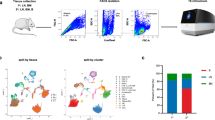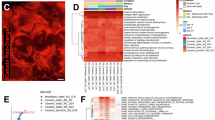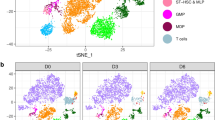Abstract
The lack of human B lymphocyte development in beige/nude/XID (bnx) mice is in sharp contrast to the robust development observed in another immune deficient strain, the NOD/SCID mouse. The ability to generate human B lymphocytes in the NOD/SCID, but not bnx mouse has been hypothesized to be caused by differences in the microenvironments or systemic cytokine concentrations. In the current studies we report that the differences in development can be primarily attributed to the source of the progenitors transplanted into the mice. The prior studies in bnx mice used cultured pediatric or adult bone marrow (BM) as the source of the CD34+ cells, whereas the NOD/SCID studies have predominantly used fresh or cultured umbilical cord blood (UCB). We have analyzed BM and UCB for the number of human CD34+/CD38− cells capable of in vitro B lymphocyte development, and have found a lower frequency of B lymphocyte generation in BM. The individual B lymphocyte clones that developed from bone marrow produced 100-fold fewer cells than the UCB-derived clones. In agreement with the in vitro studies, human B lymphocytes developed in bnx mice from both CD34+ and CD34+/CD38− cells isolated from human umbilical cord blood, but not from equivalent numbers of CD34+ and CD34+/CD38− progenitors from bone marrow. Therefore, the lower generative capacity, and frequency of B lymphocyte precursors in human marrow may be responsible for the previous results that showed a lack of B lymphocyte development in bnx mice.
This is a preview of subscription content, access via your institution
Access options
Subscribe to this journal
Receive 12 print issues and online access
$259.00 per year
only $21.58 per issue
Buy this article
- Purchase on SpringerLink
- Instant access to full article PDF
Prices may be subject to local taxes which are calculated during checkout
Similar content being viewed by others
Author information
Authors and Affiliations
Rights and permissions
About this article
Cite this article
Arakawa-Hoyt, J., Dao, M., Thiemann, F. et al. The number and generative capacity of human B lymphocyte progenitors, measured in vitro and in vivo, is higher in umbilical cord blood than in adult or pediatric bone marrow. Bone Marrow Transplant 24, 1167–1176 (1999). https://doi.org/10.1038/sj.bmt.1702048
Received:
Accepted:
Published:
Issue date:
DOI: https://doi.org/10.1038/sj.bmt.1702048
Keywords
This article is cited by
-
Reconstitution of maturating and regulatory lymphocyte subsets after cord blood and BMT in children
Bone Marrow Transplantation (2013)
-
Lymphoid priming in human bone marrow begins before expression of CD10 with upregulation of L-selectin
Nature Immunology (2012)
-
Expansion of B cell precursors after unrelated cord blood transplantation for an adult patient
Bone Marrow Transplantation (2007)
-
The thrombopoietin receptor, c-Mpl, is a selective surface marker for human hematopoietic stem cells
Journal of Translational Medicine (2006)
-
The AFT024 stromal cell line supports long-term ex vivo maintenance of engrafting multipotent human hematopoietic progenitors
Leukemia (2002)



